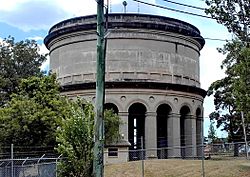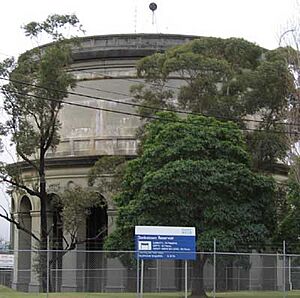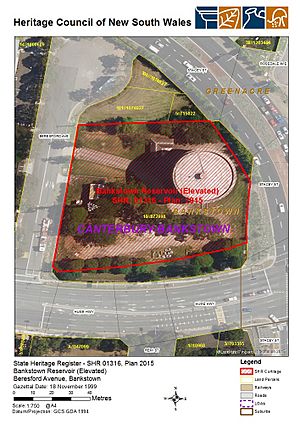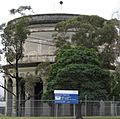Bankstown Reservoir facts for kids
Quick facts for kids Bankstown Reservoir |
|
|---|---|

The pillared water tower
|
|
| Location | 300 Hume Highway, Bankstown, New South Wales |
| Elevation | 20 metres (66 feet) AGL |
| Built | 1920 |
| Built for | Metropolitan Board of Water and Sewerage, Sydney |
| Architect | Metropolitan Board of Water Supply and Sewerage |
| Architectural style(s) | Federation Free Classical Romanesque revival |
| Governing body | City of Canterbury-Bankstown |
| Official name: Bankstown Reservoir | |
| Type | Built |
| Designated | 18 November 1999 |
| Reference no. | 01316 |
The Bankstown Reservoir is a special old water tower and a local landmark. It is found in Bankstown, Sydney, New South Wales, Australia. This reservoir is about 22 km west of central Sydney.
It stands tall on strong concrete pillars. It is one of the oldest of its kind still working! The reservoir even has fancy decorations, all done by hand. Most other water towers don't look this cool! Built in 1920, it helps provide water to a big part of South-Western Sydney.
Contents
History of the Bankstown Reservoir
The Bankstown Reservoir has an interesting past. It shows how technology improved over time. It also highlights how important water supply has always been for cities.
How the Reservoir Was Built
Building the Bankstown Reservoir started in October 1918. It was made to help the Ashfield Reservoir. It also meant less pumping from Ryde. In November 1918, the first stones for its pillars were laid. They went deep into strong clay and shale, about 2.7 meters down.
Workers made the concrete right there. They got the sandstone from a quarry at Potts Hill. A portable steam engine provided the power for the work. The outside was decorated with plastering by hand. The inside was made waterproof with a special cement spray. Hand plastering began in February 1920.
Later, in 1962, an aluminium roof was added. This roof helps keep the water clean and safe. When it was finished, the Bankstown Reservoir was the biggest elevated concrete reservoir in Australia. After this, many similar towers were built.
Future Plans for the Tower
In 2015, there were ideas to make the tower even more special. The local council and Sydney Water wanted to add decorative lights. These lights would shine from sunset to sunrise, like those seen at Vivid Sydney.
A local councillor thought the tower could become a tourist attraction. He imagined it could be as famous as the Big Banana or the Big Merino. He wanted to promote this important building in Bankstown. The plan also included new fences and native gardens. There would be signs to tell the tower's history. The lights could even change for different charity events.
Design of the Bankstown Reservoir
The Bankstown Reservoir is made of reinforced concrete. It has a round water tank at the top. It looks a bit like a rotunda or a round building. It is held up by 36 strong concrete pillars. There are also decorative arches around the base.
The inner pillars are made of reinforced concrete. The outer ones are made of plain concrete. Workers used special stone for the concrete in the tank and its pillars. They used sandstone for the curved base and foundations. Instead of a simple handrail at the top, it has a concrete wall with rectangular panels.
The tower's arches have special designs. There is a round pattern above each pillar. The bottom of the tank has a shaped edge with rectangular panels. In 2009, the structure was made even stronger. This was to meet new earthquake safety rules.
The design of the Bankstown Reservoir shows the style of the early 1900s. It mixes Victorian and neoclassical looks. The building is mostly the same as when it was built. It has only had small changes. The roof was added in the 1960s or 1970s to protect the water quality.
What the Reservoir Does
The Bankstown Reservoir provides drinking water to many homes. It serves areas like Villawood and Condell Park in the southwest. It also supplies Croydon in the east. And it reaches Auburn and North Strathfield in the north.
The reservoir can hold about 4.4 million litres of water. The water inside is about 8.7 meters deep. There is a footbridge to a walkway at the top of the tower. This walkway goes through the middle of the tank. The tower's rooftop is 86 meters above sea level. From here, you can see amazing views of the Sydney skyline and the Greater Western Sydney area. The reservoir is surrounded by different trees. These include brush box, coral tree, poplar, and fig trees.
This reservoir is famous for being the first concrete reservoir built on concrete pillars. An expert from Sydney Water said it has "the highest level of heritage protection." This is because it is the oldest of its kind still standing. He also said it is "quite decorative" and has "aesthetic value." It sits on a hill and "can be seen for miles," making it a true landmark.
How to Visit the Reservoir
The reservoir is located near the corner of Hume Highway and Stacey Street. This is in the northeastern part of Bankstown, close to Greenacre. The main way to get to the water tower is from Beresford Avenue. This is a dead end street that you can reach from Hume Highway.
Why the Reservoir is Protected
The Bankstown Reservoir was added to the New South Wales State Heritage Register on November 18, 1999. This means it is a very important historical site.
It is a great example of a common reservoir design from the early 1900s. It is the oldest elevated reservoir made of reinforced concrete that is still in use. When it was built, it was the biggest of its kind. It showed how much technology had grown. It also has beautiful designs and shows excellent building skills.
The reservoir has some special features that make it unique. These include a central concrete access tower. There is also a concrete footbridge that connects the tower to the walkway. It even has a special gauge to measure water depth. It is still actively used today. It also adds a lot to the look of Bankstown.
Images for kids






